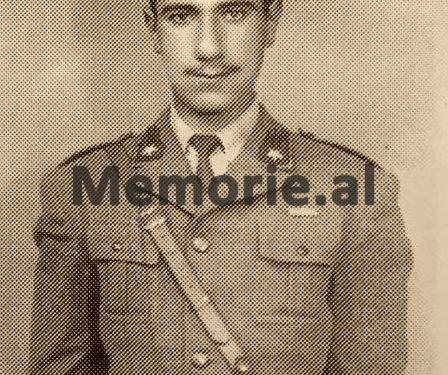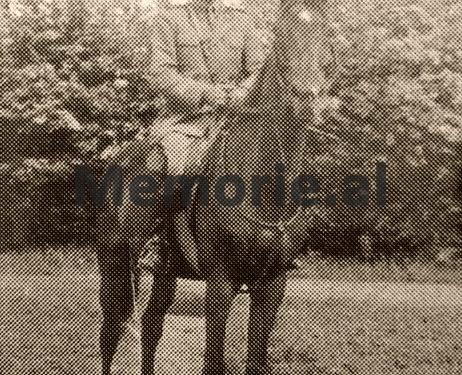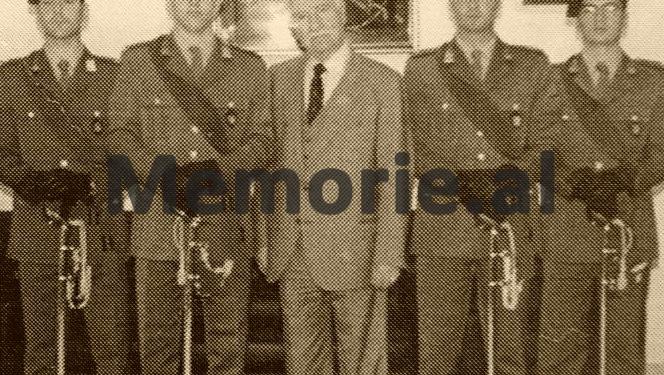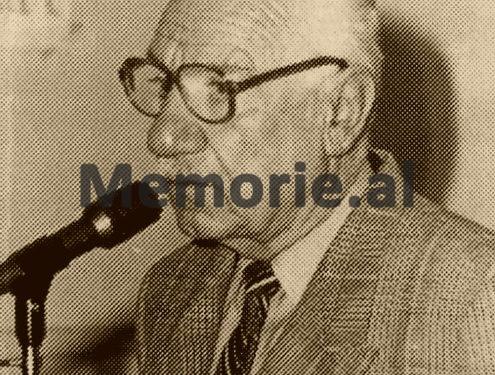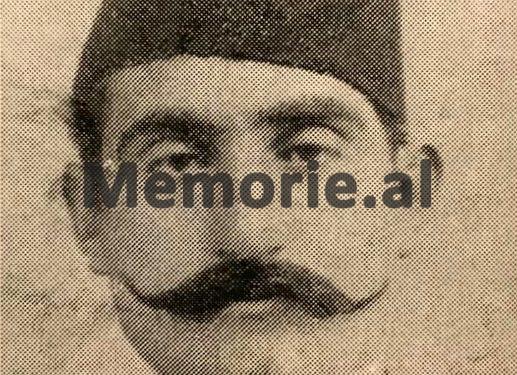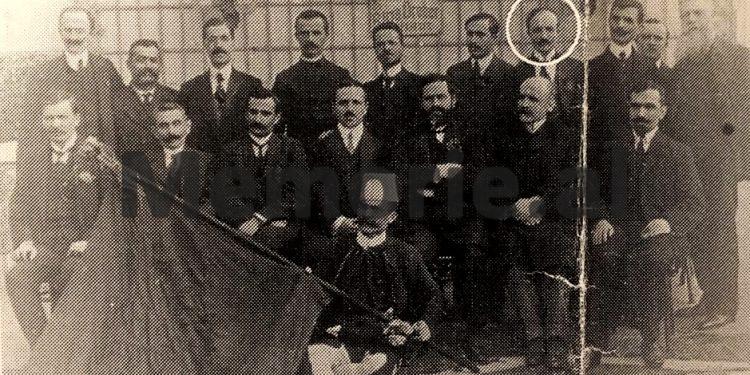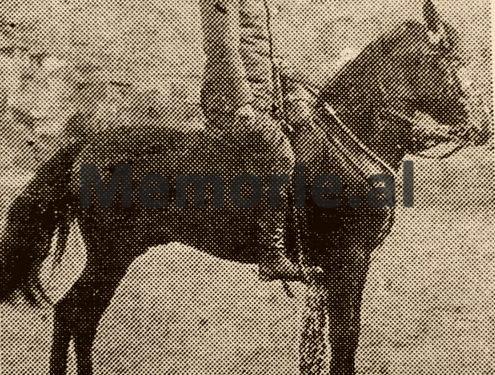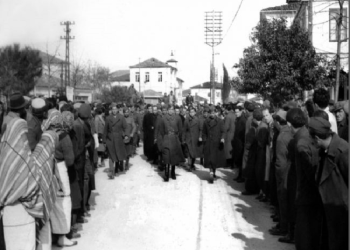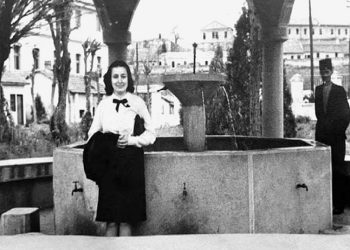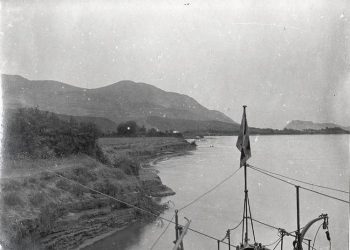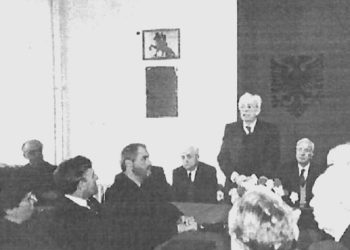Dashnor Kaloçi
Memorie.al publishes the unknown story of the famous family, Ohrid, originally from the city of Manastir, one of the most famous houses of that area for 300 years, where their first, Halit Pasha, had taken part in the Russian wars. Turkish, being an army general. How did Izet Ohri help Ismail Qemali with money and people, accompanying him to Vlora in November 1912, following the orders given to him by Qemal Karaosmani from Elbasan! The rare testimonies of Ali Ohri, the sucker of this family who followed in the footsteps of his ancestors, graduating from the Academy of Turin in the Cavalry branch, and after serving in Albania with the rank of lieutenant during the occupation period, was re-called to the ranks of the Army even in the first years after the War, organizing the unit of the Sauk Cavalry commanded by Colonel, Myslym Keta. Ali was sentenced to 8 years in political prison, after being accused of attempted escape and re-enlistment in the Army by the Chief of Staff of the Albanian Army, Petrit Dume, for the reorganization of the horse breeding department and his participation as a consultant in 12 feature films. Kinostudios “Shqipëria e Re”, where his name was not written, because of the biography!
“When Ismail Qemali came to the city of Durrës before leaving for Vlora to raise the flag, my father Izet Ohri went and met him and handed him 300 Turkish lira. The father, together with his horse that he gave to Ismail Bey, to go to Vlora, gave him a brave man to accompany him all the way and all this was given to the father by Qemal Karaosmani, my mother’s uncle from the city of Elbasan, who took over Ismail Bey and took him safely to Vlora”.
This was expressed, among others, by Ali Ohri, a sucker of one of the old Albanian families originating from the city that gave him his surname.
Who was Ali Ohri, what are his past and the origin of the family? Why did Ahmet Zogu insist next to his father, that he go to study in the military schools of Italy and why he did not abandon the officer’s uniform, but commanded the Italian soldiers who came as invaders in Albania ?! What connected him to Abaz Kupin and why did he debate with the English colonel, McLean? How did he manage to wear the military uniform in three different regimes that Albania went through and why was he sentenced to eight years in political prison ?! Why did Petrit Dumja, the Chief of the Albanian General Staff, call him as a Cavalry instructor from the early 70’s? Regarding these and other events from his life and the history of the Ohrid family, it is discussed in this article, which is based on the evidence given by Ali Ohrid himself.
Origin and history of the Ohrid family
Ali Ohri was born on May 6, 1921 in the small town of Kavaja, but the Ohri family is originally from the city of Bitola and is known as one of the most heard tribes for 300 years since the time of Turkey. Ali’s grandfather, Halit Pasha, had taken part in the Russo-Turkish wars, being a general in the Turkish army. Halit died in 1899 and left three sons. His eldest son was Ahmeti, who followed in his father’s footsteps, becoming an officer and holding the rank of major, also in the Turkish army. The other son Rifati, also an officer of the Turkish army, was the commander of the 9th Division in the Army of the Ottoman Empire that fought on the Gallipoli front, during the First World War. In the Ohrid family, documents and newspapers of that time are still preserved in good condition, where Rifat is presented in some photos as a major soldier among his Turkish subordinates, on the front line. Rifat Ohri, was one of the close friends of Mustafa Kemal (Ataturk) and he was killed in the battle of Sukarje in Turkey, in the war against the Greeks. The third of Halit Pasha’s sons was Ali’s father, Izeti, who graduated from the Military Academy in Istanbul, in the Infantry branch. After graduating as an officer in Istanbul, Izet also graduated from the Faculty of Finance, also in the capital of the Ottoman Empire. After serving for a period in the ranks of the Turkish army, Izet Ohri left at his request and moved to the city of Bitola, as Finance Inspector of the entire Vilayet. In this city, Izeti began to engage in patriotic activity for the benefit of the Albanian cause, cooperating closely with his relative, Hamdi Ohri, who later became a baxhanak. This activity of Izet, caught the eye of the Ottoman authorities, who decided to remove him from there and exiled him to the province of Mat, appointing him as deputy prefect. After working for several years in the sub-prefecture of Mat, Izet again transferred to Adrianople, with the same task. At this time in the capital of Vilajet in the city of Manastir, the director of the Treasury had died and his place had remained vacant, as to take that position according to the rules of the administration of the High Gate, in addition to other guarantees, you had to have as guarantor 4000 Turkish lira. This was done to have a guarantee of honesty and Izet fulfilled this request, being appointed as the director of the Treasury of the entire Vilayet of Manastir. In this city, Izeti married Xhenan Toptan (Ali’s mother) who was from the large Toptan family, of the Ohrid branch. She was the daughter of Muhamet Toptani (grandson of Abdulla Bej Toptani, the successor of Kapllan Pasha, who ruled Tirana), who had participated as a delegate in the Congress of the League of Prizren. Xhenani was also the granddaughter of Demir Pash Peqin, (by mother) one of the most famous people of central Albania at that time. Izet remained the director of the Treasury until the beginning of 1912, when he moved to the city of Kavaja. In that small town he bought a manor and all the while dealt only with his properties, without interfering in politics and state affairs.
Meeting with Ismail Qemali
A few months after arriving in Kavaja, in November 1912, Izet Ohri had the opportunity to meet his old friend, Ismail Qemali, who had known him since he had served in Istanbul. In this regard, Ali Ohri said: “In November 1912, Ismail Qemali, before leaving for Vlora, where the flag would be raised and the declaration of Albanian independence would take place, stopped in the city of Durrës. When my father Izeti, He learned this from his friends, went to Durrës and met Ismail Qemali, to whom he gave 300 Turkish lira, which was a considerable sum at the time. accompanied by a man of his own to have as a brave man with him.All this was given to my father by my mother’s uncle, Qemal Karaosmani, from the city of Elbasan, who took over Ismail Bey and accompanied him all the way to Vlora and his father wanted to go to Vlora to see the flag raised, but Ismail Qemali, charged him with another task to go to Trieste, Italy of Ismail Qemali, the father left for Italy and attended the Congress of Trieste, which was held from 1 to 4 April 1913. In this Congress among many patriots, such as: Fan Noli, Faik Konica, Pandeli Vangjeli, Hamdi Ohri, Aleksandër Stavre Drenova, (Asdreni), Dervish Hima, Tef Curani, Hil Mosi, Dom Pjetër Tusha, Fazlli Pash Toptani, Dr. Adhamidhi etc., my father Izeti also participated. After returning from Trieste, where Izet Ohri went on the orders of Ismail Qemali, he resumed his work in the estates he had bought in Kavaja. During the uprising of Haxhi Qamil’s rebellion, like many other patriots, Izet Ohri was arrested and sentenced to death. After that Ali’s mother, Xhenan Ohri (Toptani) paid 200 Turkish lira and made possible the release from prison of her husband Izet.
Aliu from Ankara to Shkodra
In 1924, Izet finally gave up politics, rejecting the post of Minister of Finance, which was proposed to him by his friend, Fan Noli, and his family moved to Turkey. Ali was the youngest of Izet’s four children. After moving to Turkey in 1927, Ali entered a Turkish school doing first grade. In 1928, the Ohrid family returned from Turkey and first settled in the city of Elbasan, where Ali finished second grade. Then, at the request of Padre Gjergj Fishta, a close friend of his father, he went to the city of Shkodra, enrolling in the College of the Franciscans. Aliu finished this school with very good results in 1931, being under the care of Father Gjergj Fishta. At this time, Ali’s two sisters and brother were still in school. Thus, the elder brother Ganiu, continued the Royal School of Officers in Tirana, (classmate with Todi Naçon, Hulusi Spahiu and Ferik Hadon, three former generals, convicted in the communist regime) the older sister Lemani, continued the high school in Bari of Italy for Medicine. Likewise, her younger sister, Nexhatia, attended the American Golem Mechanical-Agricultural School. After graduating from the College of the Franciscans in the city of Shkodra, in 1937, Ali graduated from the gymnasium of Tirana. After that, Ali won a state scholarship to attend one of Italy’s military schools. In this regard, he recalled: “My father Izeti did not want me to go to military school, but he obeyed the request of his close friend, General Xhemal Aranitasi, (Commander-in-Chief of the Albanian Army, Minister of Defense, in the period of the Bird Monarchy) which had a direct order from King Bird, that I should go to that school, as he wanted to prepare the next cadres of the Royal Guard, with boys from well-known families”
At the Academy of Turin in the branch of Cavalry
During the period he studied at the military high school in Milan, Ali Ohri, had classmates, Stavri Treska, Vangjel Priftanji, Mahmut Agolli and Ramiz Bodinaku and Nikol Palin, who are said to be the pride of Albanian students. Ali graduated from that school in 1940, and won the right to continue the Military Academy in Modena, in the cavalry. In this regard, Ali recalled: “At the Academy of Modena, boys from the most aristocratic and noble families of Italy studied, from Turin, Milan, to Sicily. They came from well-known families and with military traditions, and as a result were almost all anti-fascists. At that school, I participated in horse races that took place under the military program and won four competitions, up to the rank of army. In February 1942, after graduating from the Academy where I was the only Albanian to graduate from the Cavalry branch, I was sent for postgraduate specialization in Pinerolo, (Turin), which I completed in March-May. After specialization, I was appointed as an officer with the rank of lieutenant in Ferrara, at the 9th Cavalry Regiment “Lancier Di Florence”. I worked in Ferrara until August 1942 and from there I transferred to Albania, to the city of Shkodra, where the Cavalry Regiment was, in which I together with my soldiers brought 125 horses. “In the city of Shkodra, where I was the platoon commander, we did not stay long, as we were sent to Kosovo, where a conflict had broken out with the Bulgarian forces.”
Lieutenant commander with Italian soldiers in Albania
In November 1942, Ali Ohri, from the position of platoon commander in the Italian army and with the rank of lieutenant, returned from Kosovo to Albania. Regarding this period of time, Aliu recalled: “In November of that year I returned to Tirana in charge of a battalion of the Royal Guard, which in fact was never filled. In April 1943, I was transferred again to Elbasan, near the Shkumbin Barracks, where my Cavalry Regiment, which had just returned from Kosovo, was stationed. At the end of April of that year, the battalion where I was part of, together with the entire team I commanded, was assigned to go to the area of Gjirokastra, where the riots had started, a road which from Elbasan we crossed on horseback. As soon as we settled in Gjirokastra, I was called by the colonel, Ludovik De Bartolomeu (later killed by Peza partisans), who was commanding our regiment. Knowing my anti-fascist beliefs and seeing that I could never fight against my Albanian brothers, he assigned me to go to Libohova, together with two platoons of soldiers. The purpose of my going there was for me to go in front of the fascist militia teams that wanted to burn the city of Libohova, as part of the military operation that had begun in southern Albania. By order of the colonel, I, together with the two platoon of Italian soldiers under my command, set off on horseback and reached the small town of Libohova in record time, before the militia arrived, thus rescuing Libohova from burning sure. Our regiment, with Colonel De Bartolomeu, returned to Tirana where he was immediately assigned the task of taking part in the military operation to be carried out in Peza, to suppress the Communist Movement and Peza troops, which had turned into a stronghold of power of the Communist Party. In this operation against the partisans of Peza, Colonel Ludovic De Bartolomeo was also killed “.
Ali Ohri: “How did I save the communists”?
After Tirana, the Italian military unit where Ali Ohri was part of was sent on duty to the district of Shkodra and in this regard, Aliu said: “On July 26, 1943, for the first time I was very close, when the Regiment Command of the Cavalry in Shkodra, I received the order that together with the soldiers I commanded we would leave for the center of the city, where the Shkodra communists led by Nuri Llazani, had organized a large demonstration, which would celebrate the fall of Mussolini. For this, we were assigned the task of capturing all the communist leaders who led the demonstration, who according to all records, would come to the square that day. This punitive expedition was commanded by Lieutenant Ravalli and was supported by the platoon I commanded. I obeyed the command and that day, together with 44 soldiers on horseback, we went out into the city in front of the “Great Cafe”, where the demonstration would take place. Lieutenant Ravelli with the soldiers he commanded, had surrounded a large part of the demonstrators in the square and by means of the signs and signals that we of the Cavalry used, he informed me that I, together with the soldiers I commanded, should open in a straight line, that to close the siege to prevent demonstrators from getting out of there. I understood very well the signal that Lieutenant Ravelli gave me, but did the opposite of that, gathering my soldiers, in one school. After that the whole path was left free and in the direction where I was with the soldiers I commanded, all the main communists who had organized the demonstration ran away, completely escaping the siege. When Lieutenant Ravel saw this, he was furious. On the same day, a young man, a member of the National Front Youth named Mustafa Dervishi, who was studying at the University of Bologna in Italy, was killed in the demonstration. (After almost 40 years, Nuri Llazani, with great difficulty was able to declare him a martyr of the homeland). After the demonstrations were dispersed, we returned to the regiment, where a major analysis was made, holding me accountable: why did I leave the way open for the demonstrators to leave the square! At first, the Commander of the Regiment, Colonel Ferruglio, ordered me to remain under house arrest, but two days after that order, another order came from the Army Command, that I be arrested and go to military trial. “So, before I was arrested, I left Shkodra altogether and went to the city of Lushnja, where I was engaged and hid there.”
The Communists left me in the Italian army
Why did Ali Ohri, being with deep anti-fascist convictions, continue to remain in the ranks of the Italian army, which had come as an invader in Albania?! In this regard, Ali Ohri said: “Since I came from the Military Academy of Modena in Albania, I immediately met some of the main communist leaders I knew from military schools in Italy, such as Asim Zeneli, Hulusi Spahiu, Skënder Çaçi etc. I also had a close friendship with Shyqëri Ishmi, Ferik Hadon and Todi Naçon, with whom we had an old friendship. In one of the meetings I had with Todi, he told me that I definitely had to stay in the ranks of the Italian army. Likewise, when I moved to Shkodra, he through his people gave me the connection, where I would contact Rexhep Dini, one of the main communists of Shkodra. So according to their instructions, I continued to stand in the ranks of the Italian army, until the day the demonstration took place. There in the city of Lushnja, where I was engaged to Merjeme Fuga, I stayed until the day that fascist Italy capitulated, and then I returned to Tirana with my family “.
Adjutant to General Aqif Përmeti
Only a few days after the capitulation of fascist Italy, the General Command of the Albanian Army was reformed in Tirana, with Commander, General Aqif Përmeti. In this regard, Ali recalled: “General Përmeti, who upon taking office called me to the office and informed me that I would be appointed, his adjutant. At first I did not want to accept because my rank of lieutenant was small for that task, where at least you had to be a major. But General Përmeti insisted that it was not a big deal and did not constitute an obstacle in the work I would do. So I accepted and for about 45 days, I remained as an adjutant to the general, Aqif Përmeti, who resigned from that position and was replaced by another general, Prenk Përvizi. With his son Valentine, I had studied in the military schools of Italy. Aqif Përmeti resigned, and I resigned, although Prenk Përvizi begged me to continue working as his adjutant. I did not accept either the task I had or some others that General Pervizi proposed to me. I told him that I wanted to be available only to the Commander-in-Chief and my request was considered and I was left at the disposal of the Commander. Thus, for some time I stood without doing any work, taking care of only a few horses left at the Royal Palace (Brigades) by those that King Zog had with his family.
Debate with Colonel McLean!
Ali Ohri, in addition to having connections with the leaders of the Anti-Fascist Movement who were members of the Communist Party, whom he had helped on several occasions, he also had connections with Abaz Kupi or the “Little Bird”, as the communists called him, because he was the most loyal man left to the King in Albania. One of the reasons that Ali Ohri was closely associated with Abaz Kupin was that he had a monarchist conviction, although his father Izeti was neither a Zogist nor an opponent of King Zog. In this regard, Ali recalled: “I have been associated with Abaz Kupi since February 1943, and then from the autumn of 1944 I participated with his forces, fighting against the Germans in the area of Kurbin. I remember that at the time I was close to the Cup forces, I had a heated debate with British Colonel McLean, who along with Major Julian Emery, were attached to the headquarters of the Cup nationalist forces. This happened there from the first week of September 1944, when we were in the village of Listerë in the Kurbin highlands. After a heated argument with McLean, Major Julian Emery approached me and asked, “What did you have with the colonel?” I did not give him an answer regarding what I debated with McLean, but I addressed him: Major, are you able to tell me what will be done now with Albanian nationalism and nationalists? To my question, the British Major Emri answered: Lieutenant, Albanian nationalism will now be grounded, and will not take its head off for 40 years. That’s how he addressed me, putting his index finger on my chest. ”
Lieutenant in the Sauk Cavalry Department, commanded by Myslym Keta
In the last days of the war, Ali Ohri left Tirana to escape any possible arrest by the communists, who did not want to know about the help he had given you when he was in the ranks of the Italian army. At the beginning of 1945, Aliu found himself in the ranks of the army led by the Commander-in-Chief, Colonel-General, Enver Hoxha. Regarding this, Aliu recalled: “In March 1945, when the Albanian Cavalry was established, I was called by the Ministry of Defense and mobilized as an officer, recognizing me as a lieutenant. I was assigned as a Cavalry instructor in the Sauk ward, commanded by Myslym Keta. I remained in that ward until February 1947, when I was released. During this time, on the occasion of the feast of July 10, in 1945, I organized horse races at the “Qemal Stafa” stadium, which was attended by the highest leaders of the state, including Enver Hoxha.
After being released from the army, after working for a while in Tirana, Aliu was sent to work in Shkodra, near the Zootechnics station. His transfer to Shkodra would be fatal, because in June 1949, he was arrested by the State Security. In this regard, Ali recalled: “After working for more than a year at the Zootechnics Station, on June 30, 1949, I was arrested on charges of” attempting to escape in a group. “For my arrest, one of the main captains of the State Security, Major General Zoi Themeli, came from Tirana himself. After my arrest, three of my friends, former officers and members of the Anti-Fascist Movement, Naim Kuçi, Xhavit Zaloshnja and Maksut Voshtina, were also arrested. The accusation against us was completely fabricated, because the four of us, as ex-soldiers, were friends with each other, but we had never thought of escaping. After 13 months of isolation and interrogation, I was sentenced to 8 years in political prison, from where I was released on April 7, 1954.
Lieutenant General Petrit Dume, the young woman is calling to the Army!
After his release from prison in 1954, Ali worked as a mechanic in various companies in Tirana, being one of the most famous masters in his craft. For this he was helped a lot by the practice he had done in the military schools in Italy. After many years in the profession of mechanic, in 1972, by order of Petrit Dume, Chief of Staff of the Albanian Army, Ali was called back to the Army, being appointed as an instructor in the horse breeding department, which was at Rrapi i Treshit. In this regard, Ali recalled: “My re-enlistment in the Army, although as a civilian, in addition to the professional pleasure it gave me in dealing with horses, was also a peace of mind. Since the end of the War, for the first time in the three years I worked there, I had calm, because all the time I stayed with the anxiety of a former political prisoner, who could be re-sentenced again! I left that ward after the blow that Enver Hoxha did to Beqir Balluku e Dumes, in 1975. The thing that worried me the most was the demolition of that ward, where the horses of the breed were raised, which is also reflected in the film of the famous director, Saimir Kumbaro “Death of the Horse”. It is a real event, where I want to say that Petrit Duma’s horse was put in a cart in Durrës and then killed by mistreating him “.
Consultant in 12 feature films of Kinostudio “Shqipëria e Re”
After many years of work, in 1981, Ali Ohri retired from the Meat and Milk Factory. In 1982, he was called for the first time by Kinostudio “Shqipëria e Re”, as a consultant. Regarding this, Aliu recalled: “The directors needed me regarding the films that had to do with horses and the foreign armies that had been in Albania. I have participated as a consultant in 12 feature films of Kinostudios, but my name was never written in the subtitles of the films, because the directors were afraid of my biography, but I did not even claim it. Only the director Dhimitër Anagnosti, had the courage and honesty and wrote my name as a collaborator in the film “Stones of my house”, where we worked together for four months in the coastal area of Himara “. In addition to film consulting, I have personally organized many horse races, which remained one of the greatest passions of my life, since the Italian military schools, but after the demolition of the equestrian ward in 1975, they were not organized on horse racing, until 1983 when we resumed organizing them almost every year. In 1988, I managed to create the Albanian Equestrian Federation, and since that day, I have been its elected President “. Ali’s passion for horses was inherited by his son Izeti, who since the age of 13, has participated in all horse races that have taken place in Albania. He is currently in Italy, where he has won five trophies in equestrian competitions held in several regions of the South. One of Ali’s other passions is history and literature. He published the book “Shoku im kali” and translated from Italian the book “Siege of Shkodra”, by Italian author Gino Berri. Ali had a very rich library, which you seized when he was arrested and put in prison. /Memorie.al




